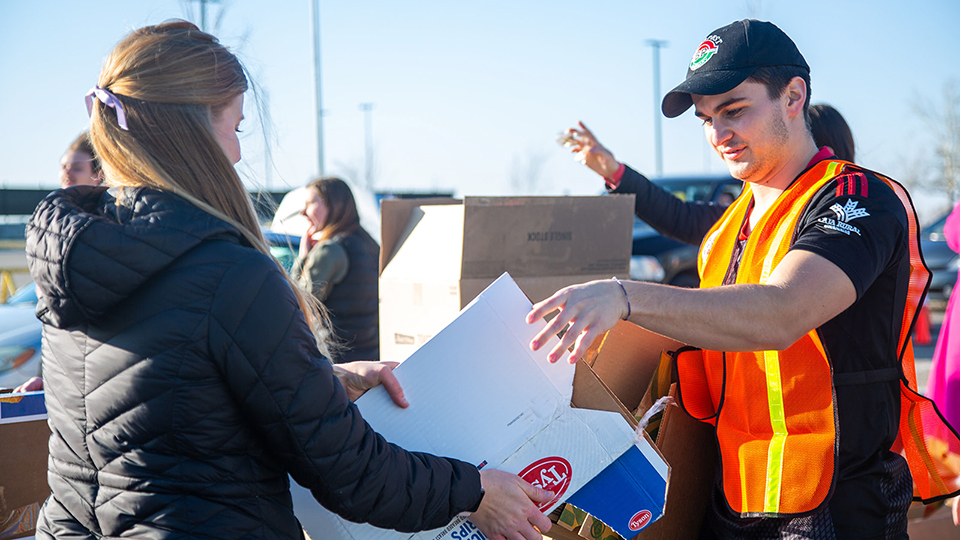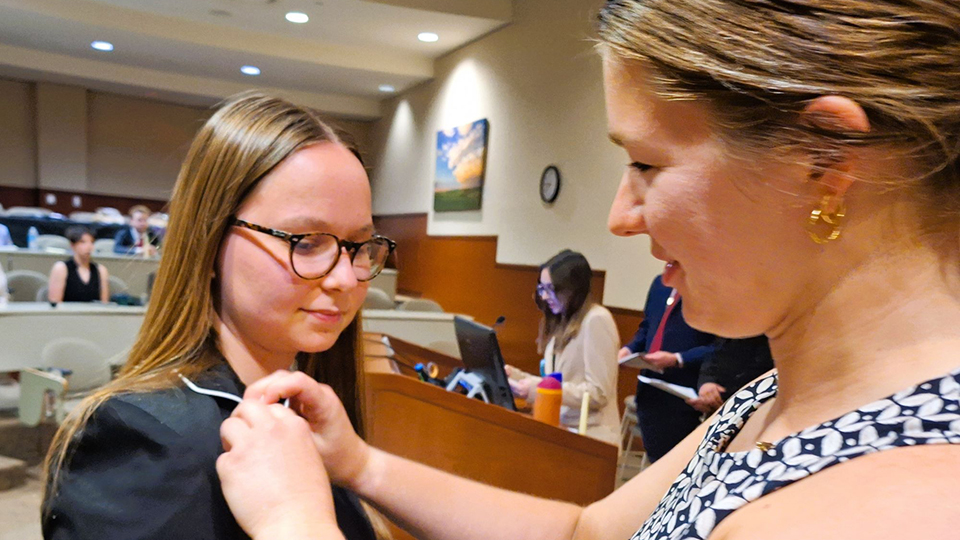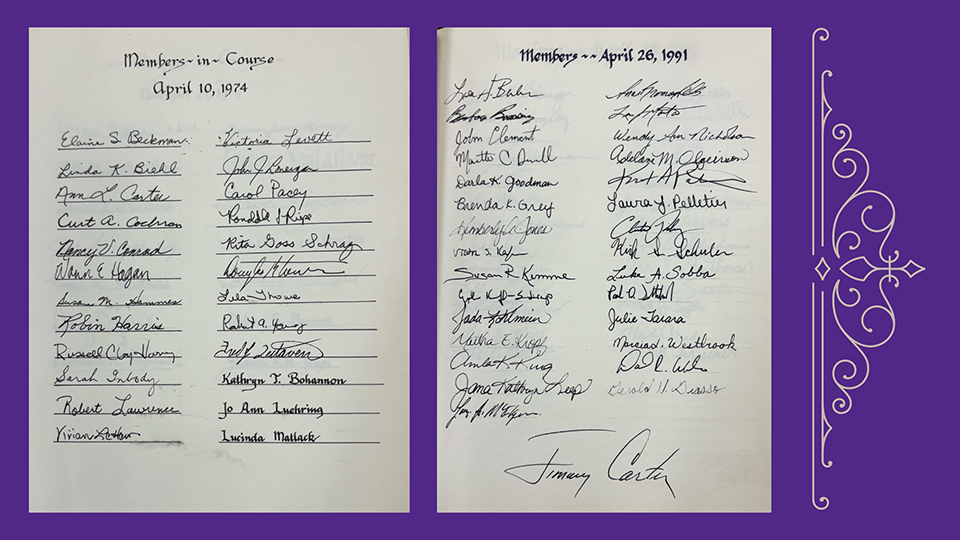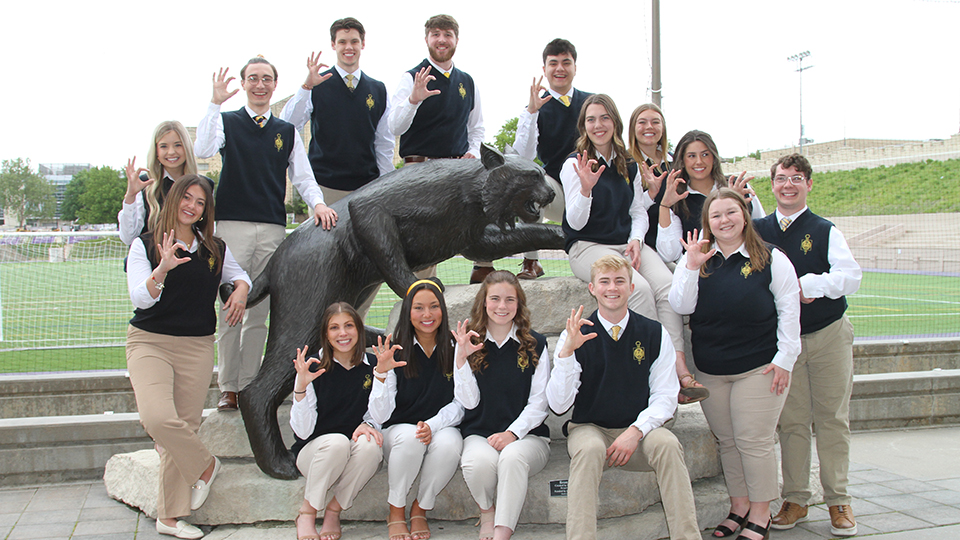A time-honored tradition: K-State’s student honor societies celebrate scholarship, service and more
As an institution, Kansas State University is known for its traditions — from rocking
back and forth to the Wabash Cannonball; singing of the spot we “love full well”; enjoying a scoop of Purple Pride ice cream
at Call Hall; to countless other favorites passed down through the university’s more
than 160-year history.
Another one of those proud traditions is the student honor societies on campus, which
for many years have recognized exceptional students for their scholarship, leadership,
service and more. Blue Key, which dates back to 1934 on campus, once helped organize
Homecoming. Phi Beta Kappa traces its roots to the American Revolutionary War period.
K-State’s student organization portal recognizes more than 25 student honoraries on campus, each one offering a unique
opportunity to celebrate students.
We recently spoke with K-Staters involved in three of these campus honor societies
— Mortar Board, Phi Beta Kappa and Blue Key — to highlight what these organizations
bring to the university community.
🏆 Mortar Board
Organized in 1914, this K-State honor society was originally known as the XIX Senior
Honorary for Women. It was renamed Mortar Board in 1928 after affiliating with a national
organization. Mortar Board allowed men to join in the 1970s.
Murry Streetman, assistant professor in the Staley School of Leadership, serves as
one of the Mortar Board K-State chapter advisers. The organization is primarily focused
on college seniors, although some juniors are involved as well.
“It has this unique history,” Streetman said of the organization. “Leadership, service
and scholarship are the three pillars of Mortar Board, and here at K-State we lean
particularly heavily into the service piece.”
Part of that service experience includes partnering with Wildcat Dialogues, a program bringing together hundreds of new and first-year students for an evening
of connection and meaningful cross-cultural dialogue. Mortar Board members help organize,
prepare for, and facilitate the conversations at this event. Mortar Board also assists
with mobile food distribution through HandsOn Kansas State.
“Many of them will make comments like, ‘You know, I've never done something like that
before,’” Streetman said of the students. “And I think that it is a great learning
experience for them.”
Mortar Board also hosts a special end of the year celebration where the outgoing and
incoming members work on a service project together. This year’s project was rehabilitating
an exhibit at Manhattan’s Sunset Zoo.
Streetman said that he is continually impressed by the members of Mortar Board and
their willingness to take on the mantle of extra responsibility. Many of them are
involved in a number of organizations on campus, and time can be tight, especially
their senior year. However, the students don’t allow that to deter them.
“I think it's a great opportunity for them to really end their K-State experience
on a high note,” he said. “It is that opportunity to give back to the community in
a way that most of them find very rewarding. I also think with our focus on leadership,
it’s helping them get prepared for the unknown, what comes next for them. It helps
them think about taking charge of their own life in a way that, if things don’t go
the way that they had planned, is it still something they feel empowered to manage
and drive in a positive direction?”
He said the organization is hoping to host more alumni events in the future to keep
previous Mortar Board members involved.
“It’s an engaged, diverse group that really is trying to make positive change in the
world,” he said. “I have loved my opportunity to be a part of that group. And I do
find them inspiring for me personally.”
🏆 Phi Beta Kappa
Phi Beta Kappa was founded at the College of William and Mary in Williamsburg, Virginia,
in 1776, and the K-State chapter of Phi Beta Kappa was chartered in 1974 after a site
visit and approval by the national organization.
Phi Beta Kappa recognizes juniors and seniors for excellence in the liberal arts and
sciences, as well as scholarly achievement, good character and broad cultural interests.
K-State is among just 10% of higher education institutions to host a chapter, and
the organization’s nationally-recognized membership includes 17 U.S. presidents; 42
U.S. Supreme Court justices, including six of those currently serving; and more than
150 Nobel laureates.
“It’s the [nation’s] oldest and most prestigious honor society; it started with the
birth of the country,” said Mary Hale Tolar ’90, ’09, dean and associate professor
in the Staley School of Leadership. “It was quite something for K-State to receive
the charter.”
Tolar was inducted into Phi Beta Kappa as an undergraduate and now serves as the members-in-course
committee chair for the K-State chapter. She said the organization ushers students
into a national network of professionals and is a badge of honor on a resume or graduate
school application.
“This is a recognition of a student’s outstanding academic and intellectual pursuits,”
she said. “All this truly is a mark of distinction. It's highly selective and it's
based on your academic record and your intellectual merit.”
Tolar said that one of the most powerful things about K-State’s involvement in Phi
Beta Kappa is how it dismantles the false narrative that an institution has to focus
on either practical, applied service to the state as a land-grant university, or the
intellectual, academic pursuit of the arts, humanities and sciences — “learning for
learning’s sake.”
“We are absolutely a land-grant that is about preparing people for our professions
and our communities, to be active and engaged,” she said. “And we are also very much
fostering and celebrating students’ intellectual curiosity and scholarly engagement
that is necessary to envision and create the world that we would like to see in the
future.”
The organization also unites distinguished students from across campus.
“We have students from all the different colleges who have invested in language learning
and in the liberal arts and sciences,” Tolar said.
🏆 Blue Key
K-State’s chapter of Blue Key was chartered on Feb. 27, 1934, and was tasked with
running the university’s Homecoming festivities.
Jackie McClaskey ’93, ’14, a current Blue Key adviser and president and CEO of the
American Royal Association, is herself a Blue Key alumna. It was during her time as
a student at K-State that Blue Key transitioned planning of Homecoming to the K-State
Alumni Association and then shifted its focus to leadership development programming.
“It truly was a life-changing experience for me as a student,” McClaskey said of her
involvement with Blue Key. She was honored when an opportunity arose to serve as an
adviser for the K-State chapter. “It was something I couldn’t imagine saying no to.
I can’t really think of a better way to spend volunteer time.”
Blue Key seeks to support student leaders as they empower their peers to also become
leaders through mentorship and teaching. McClaskey refers to it as “an intensive leadership
experience with exceptionally high expectations,” where members are given one year
to make a difference on campus.
“Each class has the opportunity to really build their own pillars for leadership and
service and develop a plan of how they want to serve the campus community,” she said.
Blue Key’s programs include: Catalyst, a semester-long learning experience about topics important to personal growth, such
as self-confidence, goal setting and time management; Quest Freshman Honorary; and the presentation of scholarships.
One of these scholarships is the Mistler Professional Development Award to support
travel for personal and professional development to a conference, seminar, summit,
or other specific event. The late Richard Mistler ’62 was a Blue Key alumnus and continued
to be an avid supporter of the organization throughout his life.
McClaskey said that it’s inspiring to watch what students can do on campus when they
are given the freedom and flexibility to lead and create change. The skills they learn
from their time in Blue Key — from how to be a good mentor, to discovering how to
collaborate with other leaders — will last them a lifetime.
“The young people are incredible,” she said, adding that as an adviser, she learns
from the students as well. “It’s just really fun to see them look for ways to give
back with their talents.”




